
Written by Scott Harrison and Eli Maynard
In the modern business landscape, loyalty programs have emerged as indispensable tools for driving both customer loyalty and sales in today’s competitive business market.
Whether you are launching a new loyalty program or looking to improve your existing one, one of the most important decisions you will make is choosing the right loyalty platform or loyalty management software (LMS).
A loyalty platform is an essential software solution that helps businesses create, manage, and track their loyalty program. Without the right platform, it can be very difficult to achieve your business goals.
This guide will outline the steps for choosing the best loyalty platform:
- What is a customer loyalty platform?
- Brief history of loyalty technology platforms
- Four types of loyalty platform solutions
- Steps for choosing the best loyalty platform
- Key features to look for in a loyalty management platform
- List of best loyalty platforms for 2025
- Choosing the right loyalty platform for your business and program design
What is a customer loyalty platform?
A loyalty platform is a marketing software or technology that helps businesses set up, manage and track their customer loyalty programs. Ultimately, loyalty platforms are a rules engine.
Best-practice platforms can support complex rules supporting all manner of earn, redeem, expiry, progression, regression, referral and promotional campaign rules. This includes being able to support all types of loyalty program frameworks.
The loyalty program operator can feed in available transaction data (such as the date and time, product Stock Keeping Unit (SKU), cost and retailer), personal data (such as a member identifier, demographic data and segmentation group/s) and offers, and the platform can apply a range of rules in real time to deliver a variety of specified outcomes designed to generate member engagement. This may be bonus points, cashback, new status tiers, product discounts, or many other rewards.
Brief history of loyalty technology platforms
Loyalty platforms have traditionally been expensive and inflexible, but more recently a range of high-quality, cost-effective platforms have entered the market, delivering companies the ability to better realise their innovative visions, while making the loyalty technology industry increasingly competitive.
These newer loyalty platform providers have been designed for easy Application Programming Interface (API) integration with other systems and provide highly complex campaign capabilities, app and digital wallet support, automated machine learning capabilities, and extensive analytics functionality.
As a result of these technological and industry shifts, companies are increasingly shifting away from a reliance on internally developed systems (which are typically legacy systems) and moving towards the adoption of more flexible solutions as listed below.
This raises the important question that many of our clients have…
Should we develop loyalty platform features in-house OR should we adopt a third-party loyalty platform?
The answer is not clear as every business is uniquely different, but…
The below summary table on the advantages and challenges of different loyalty technology approaches can assist a business to weigh up the pros and cons. If you have this question, our experts are happy to arrange a call to help address your thoughts.
| In-house developed loyalty platform | External, third-party loyalty platform | |
|---|---|---|
| Advantages | Full, direct control Flexibility to develop and make changes without reliance on third-party roadmap May be easier for initial integration period | Time and cost efficiencies Access to specialised loyalty platform capabilities, expertise and continued platform updates Externalised platform maintenance and support |
| Challenges | Resource intensive from a time, cost and effort perspective Internal team may lack the genuine expertise to deliver a best-practice loyalty management solution Innovation, research and development requirements may clash with other internal priorities | New third-party dependency among technology infrastructure Integration may require initial additional effort and resources Operational considerations for platform onboarding, education and change management |
Four types of loyalty platform solutions
As our loyalty technology experts defined in Loyalty Programs: The Complete Guide, loyalty platform solution providers can be categorised into four main groups:
1. Full-service loyalty solutions
Provided by specialised loyalty agencies which deliver everything required to run the loyalty program as part of an outsourced approach. This could be viewed as the full, white glove service.
Services include delivery of a loyalty program website and/or app with the client’s branding, the back-end platform holding member accounts and points balances, status tier and profile data, customer service support, analytics processing, supply of reward products, account management, consulting services for the future evolution of the loyalty program, full lifecycle marketing management (including trigger emails at key points of the member journey) and customer care support.
With this type of solution, the client rarely has direct access to the platform itself, as it is generally limited to agency personnel.
2. Partial service loyalty solutions
Focused more on the technology rather than a full-service offering, but with the option to provide additional support if required.
This solution usually allows the clients to have direct access to their platform, with the platform enabling the running of the loyalty program, rather than the service provider actually running it.
The agency (usually a smaller agency) may also provide some marketing strategy formulation and execution, reward support co-ordination and customer care support, as required.
3. Off-the-shelf loyalty solutions (SAAS)
Come with an extensive array of features and functions that will deliver to the technical needs of a client looking to launch a loyalty program or replace the legacy platform of their existing loyalty program.
They are designed to be user-friendly, self-service and configurable to minimise the amount of additional client support required post-launch.
This type of platform is suitable for program operators seeking maximum control over their operations.
4. Niche loyalty solutions
May provide a partial solution which solves a specific problem.
Niche solutions specialise and excel in their area of expertise, with the ability to solve an issue effectively and efficiently, however additional technical solutions will likely be required to run the complete loyalty program.
An example is a company providing a comprehensive solution for managing the front-end and back-end of a loyalty currency, reward partner supply network and redemption store, such as LoyLogic.
Another example is a company providing a solution to support the collection of member transaction data across multiple disparate point of sale (POS) systems or from third-party retailers. Other examples may be solutions which support card linking or blockchain and Web3 loyalty elements.
Steps for choosing the best loyalty platform
1. Find out what is out there
The first step in choosing the right loyalty platform is to research your options. It is essential to understand the loyalty marketing technology landscape before anything else. You can find information about loyalty platform solutions online, in industry publications, and at trade shows.
Tip: Be careful, there are hundreds of marketed loyalty platforms out there; some great, and some not so great. Many stock-standard lists available online do not provide a fair representation of the loyalty management market and genuine loyalty platform market leaders.
Consider factors such as features, functionality, ease of use, scalability, integration capabilities, reputation, and customer reviews (which may not be as easily accessible for more enterprise platforms) to narrow down your pool to a few platforms.
To ensure the best results, consider engaging a loyalty consultant – even to gain an initial understanding of the landscape. This will provide you with a tailored approach, and shift time and effort onto the consultant. These customer loyalty platform experts can also provide insights into the latest loyalty marketing trends, program design best practices, and which platforms are most suitable for your specific industry and business model.
At Loyalty & Reward Co, we have assessed hundreds of platforms. We do not have our own technology, and therefore use our independence to evaluate the optimal platform based on your business goals and strategy (rather than on a product).
2. Run an RFI process
Once you have gained a basic understanding of the available options, you can initiate the RFI (Request for Information) process. The RFI is a preliminary step that helps you gather essential information about potential loyalty platform providers – this may be one preferred vendor or a short-listed selection.
During this stage, it is essential to compile a list of well-crafted questions and requirements that you can send to these providers. Firstly, this should include questions about the platform’s features and loyalty capabilities, pricing, scalability, ease of use, integration capabilities, and customer support.
Secondly, providing a high-level overview of the program design, vision and/or business strategy can help the platform address the most important question: can Platform X deliver to the loyalty program design? As customer loyalty experts, we would strongly recommend you create the strategy before you choose a platform.
This stage allows you to filter out platforms that do not align with your business needs and/or cannot deliver to your vision, placing you in the best position for subsequent stages.
A loyalty consultant can help you to create RFI documentation and ensure that you are asking the right questions. This can you save time, effort, and money in the future. At Loyalty & Reward Co, we are tech agnostic, meaning we will help you to choose the best platform for your needs without any biases.
3. Run an RFP process (situational)
After the RFI process, you may choose to proceed to a RFP (Request for Proposal) stage. An RFP is typically only required for larger organisations with specific needs and more complex procurement processes. It will typically be a more rigorous process than a RFI, whereby shortlisted loyalty platform providers are invited to submit formal proposals in response to a set of detailed business and technical requirements, provided by your business.
The RFP should include information about your business goals, expectations and the desired features and functionality of the platform, and any specific customisation you require. This usually includes a high-level technical overview of your business to ensure the platform can begin to conceptualise how they fit into your existing architecture. Providers will respond with proposals that outline their commercial offerings and how they can meet your needs.
As in the previous stages, it is highly advisable to engage a loyalty consultancy to streamline this process. Loyalty consultants have a deep understanding of the loyalty management software landscape and can help you to evaluate the proposals as objectively as possible and choose the best platform for your business.
4. Finalise selection of best platform
Once you have received and reviewed the proposals, you need to carefully assess each provider’s suitability. Consider factors such as platform features, scalability, pricing, compatibility with your existing systems, reputation, location of the platform’s team (if that matters to your business), and customer references.
If you are building a large and complex program, assess the loyalty platform customisation and scalability capabilities. You must also determine if the platform can accommodate various loyalty program structures, reward types, and customer engagement strategies that are required for your program. Additionally consider the loyalty management software’s integration of the platform and analyse the cost-effectiveness of each platform to help make your final decision.
Ultimately, you should select the platform that best aligns with your business goals for the program and offers the right balance of features and cost.
5. Sign the contract and implement
Once you have chosen the best loyalty platform for your business, finalise the agreement and sign the contract with the selected provider. Ensure that the contract details all relevant terms, including pricing, service levels (if applicable), and implementation timelines and scope.
Once the contract is signed, the focus shifts to program implementation. Collaborate closely with the platform provider to implement the loyalty program seamlessly within your organisation. The successful execution of the loyalty program relies on effective implementation, so it is crucial to work closely with your chosen provider to ensure a smooth launch.
If you followed the recommended approach of engaging a loyalty consultancy, your consultants will support you and help you implement the program. They will work closely with both the platform provider, and your brand. This approach allows you to maintain focus on your internal business task, rather than a significant reallocation of resources to implementation, as the loyalty consultant can handle most of the heavy lifting in conjunction with the chosen platform vendor.
Why engaging a loyalty management expert can help
A loyalty consultancy firm is a company or individual that specialise in strategically designing and implementing loyalty programs. They may also support post-launch operations and future roadmap evolution if required.
This approach allows your company to access experienced loyalty professionals as required, whilst maintaining the desired level of flexibility and control over your loyalty program operations and future strategy.
Loyalty experts:
- Bring a wealth of experience and industry knowledge to the table.
- Possess a deep understanding of the loyalty design and technology landscape.
- Help you choose the best loyalty platform for your specific business needs and goals.
- Assess the features of different platforms.
- Save you time and money by helping you identify a shortlist of potential vendors and conduct evaluations.
- Help you negotiate contracts with your chosen platform.
- Can provide ongoing support through implementation, and help you optimise your program post-launch.
- Can work closely with your chosen vendor for the best results.
Engaging a loyalty expert, such as the Loyalty & Reward Co team, can help you to make informed decisions about your loyalty program and ensure that you are choosing the best platform for your business needs.
Key features to look for in a loyalty platform
There are several key essential features to look for when choosing the best loyalty platform to meet your business needs and objectives. These features can empower your loyalty program, enrich your customer relationships, and drive success in a competitive marketplace. The following features should be considered when looking for the most appropriate and best loyalty platform for your loyalty program.
Rules, offers, and promotions engine
A robust platform should offer flexible rules and promotion engines. This will enable the creation of customised loyalty programs tailored to specific customer segments, allowing for dynamic rewards and loyalty promotions.
Questions for you to consider:
- What types of behaviours does our business want to incentivise and stimulate?
- Is the platform flexible enough to meet our specific needs?
- Can the platform support complex loyalty rules, offers, and promotions?
- How comprehensive do we require our promotions engine to be?
Reward and redemption capabilities
Being able to have an easy reward and redemption process for your program is critical. Look for a platform that supports various reward options and easy redemption processes to ensure that your customers can redeem their rewards quickly and easily.
Questions for you to consider:
- What types of rewards does the platform support?
- Is it easy for customers to redeem their rewards?
- Do we require a rewards store? Does the platform support a rewards store?
- Can we provide rewards internally, or will we be reliant on a third-party, reward supplier?
Campaign management
Effective campaign management tools are essential for designing, launching, and tracking loyalty campaigns efficiently. This will help you ensure that your program remains engaging and relevant to your customers.
Questions for you to consider:
- Can we easily segment our customers and target them with relevant campaigns?
- Does the platform support integration with our existing marketing automation tools?
- Can the platform help us design, launch, and track loyalty campaigns efficiently?
Gamification features
Features such as challenges, badges, and interactive games can make your loyalty program more engaging and fun for your customers. Gamification features and capabilities are key when choosing a loyalty platform if you want to make your program as engaging as possible.
Questions for you to consider:
- What gamification features does the platform support?
- Do we require basic or more complex gamification features for our loyalty program?
- Does the platform provide insights into how customers are engaging with our gamification features, so that we can optimise them over time?
Reporting and Analytics
Comprehensive reporting and analytics tools are essential for tracking the performance of your loyalty program, gathering customer insights, and making data-driven decisions to improve your program over time.
Questions for you to consider:
- Can we track the performance of our loyalty program across all key metrics?
- Does the platform provide comprehensive reporting, templates and analytics tools?
- Can the platform provide real-time data and reporting, or is it limited to periodic updates?
- What reporting capabilities will we require out-of-the-box, versus what data will we extract to our own existing reporting tools?
Integration Capabilities (APIs)
Integration with your existing systems and third-party services is vital. This may include CRM, CDP, CMS, POS, eCommerce, App, socials and other critical systems. Ensure that the platform offers APIs for seamless data exchange and functionality. Every business will be different based on their industry and operating channels (online, offline or both).
Questions for you to consider:
- Does the platform offer APIs for integration with our existing systems and third-party services?
- Is it easy to integrate the platform with our existing tech stack? Do you have a middleware layer?
- How well do the APIs work? Are they well-documented and easy to use?
Security and fraud monitoring
Prioritise platforms that offer robust security measures and proactive fraud monitoring to protect your loyalty program and customer data.
Questions for you to consider:
- What security measures does the platform have in place to protect our customer data?
- Does the platform meet our industry-specific compliance requirements?
- Does the platform offer proactive fraud monitoring?
User interfaces
When choosing a loyalty platform, it is important to consider how users will interact with it. Some platforms provide front-end capabilities, while others focus solely on backend management. If you need front-end capabilities, make sure that the platform offers the features and functionality you need.
Questions for you to consider:
- Do we require front-end capabilities? Does the platform provide these front-end capabilities?
- For front-end, is the user interface (UI) for customers easy to use and navigate? What level of brand customisation is available (e.g., to match brand colours and fonts)?
- For back-end, is the user interface (UI) for internal business users easy to use and navigate? What level of user permission access and control can be customised to meet the needs of different users?
Scalability
The platform should be scalable to accommodate existing and future growth of customer size and activity, in order to mitigate any major disruptions. This is important to check because every business will have different requirements based on their size and activity volume – for example, a traditional automotive company will have a relatively low frequency of touchpoints compared to other industries, such as fast-fashion retail or consumer grocery. Some businesses may also need to consider scalability in relation to multiple markets or regions.
Questions for you to consider:
- Is the platform scalable to accommodate current customer behavior, and future business growth?
- Can the platform support our expansion into multiple markets or regions? Do we require this?
- How does the platform handle spikes in traffic, such as during promotions or peak seasons?
Customer and local support
Access to prompt customer support and having a local platform team can be invaluable, ensuring that your program implements and operates smoothly and addresses specific requirements effectively.
Questions to consider:
- Does the platform offer 24/7 customer support?
- Does the platform have a good track record of customer satisfaction?
- Do we require a local platform team? Do they have a local team?
By considering all these key features when choosing a loyalty platform, you can select the best possible solution to meet your business needs and objectives.
List of best loyalty platforms for 2025
Here is a rundown of the best loyalty management solutions and loyalty technology solution providers currently available on the market for your business to consider in 2025:
- Annex Cloud (Loyalty Experience Platform)
- Antavo (Loyalty Cloud)
- Capillary Technologies (Loyalty+)
- Comarch (Comarch Loyalty Management)
- Eagle Eye (Eagle Eye AIR)
- Epsilon (Epsilon PeopleCloud)
- Marigold (Marigold Engage+ and Loyalty)
- m-wise (m-wise Loyalty Cloud)
- NeoDay
- Open Loyalty
- Salesforce (Salesforce Loyalty Management)
- Mastercard (SessionM Loyalty Platform)
- SimplicityCRM (Simplicity Loyalty)
- Talon.One
- Voucherify
- White Label Loyalty
- eCommerce and Shopify Loyalty Apps
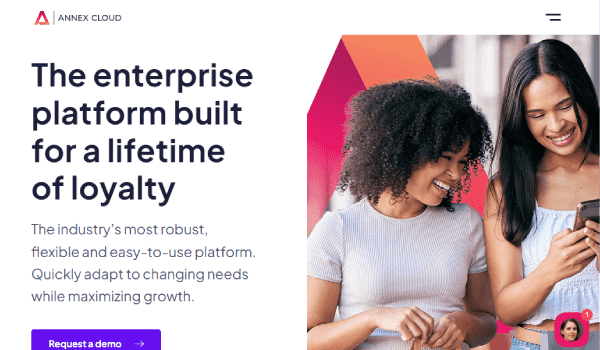
Annex Cloud (Loyalty Experience Platform)
Based in the US, Annex Cloud is a fully featured platform which includes the capability to run complex loyalty currency calculations, tiering, and offer management. Annex Cloud services both mid-market and enterprise clients with clients such as Harrods, Harley Davidson, GPC and Toyota.
Key features:
- Capability to run complex loyalty currency calculations, tiering, and offer management.
- Has been developing its referral functionality for about 6-7 years and claims to have a best-in-class solution.
Best for:
- Medium-to enterprise-sized businesses and SaaS companies.
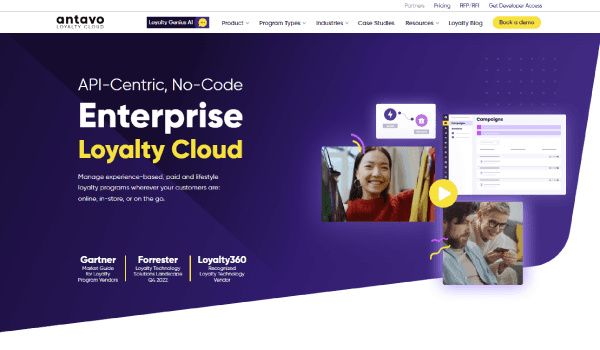
Antavo (Loyalty Cloud)
Antavo is a pure-play loyalty program technology vendor started in Hungary, with a global presence. Antavo offers a wide range of features, including customer segmentation, rewards management, and gamification. Clients include KFC UK & Ireland, BrewDog, and Rip Curl.
Key features:
- There are twenty out of the box modules available for selection by Antavo’s clients, which provides good flexibility.
- For a full-service platform, their pricing structure is typically more affordable than most others.
Best for:
- Medium-to enterprise-sized businesses, primarily in retail and fashion.
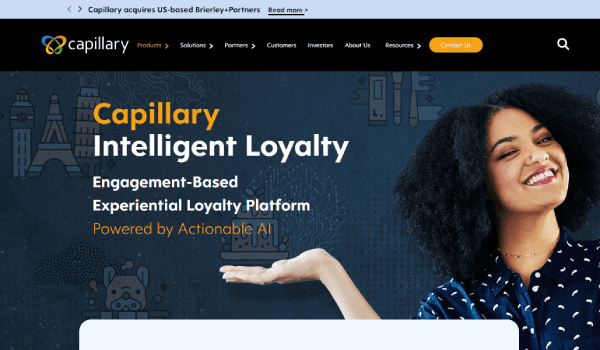
Capillary Technologies (Loyalty+)
Capillary Technologies is an enterprise-grade SaaS technology provider based in India. Capillary’s AI-enabled loyalty management platform comes with a suite of solutions to create a single view of customer across insights, engagement and personalised experiences. Clients include Vishal Mega Mart, Shell Indonesia, Unilever.
Key features:
- Robust functionality and a flexible data model. It excels in both loyalty program management and marketing, as well as creating actionable insights from both customer and business data.
- Invested significantly in development of built-in AI & ML propensity models for improved customer segmentation, targeting and future business forecasting.
Best for:
- Medium-to enterprise-sized clients requiring all-in-one loyalty, marketing and CDP.
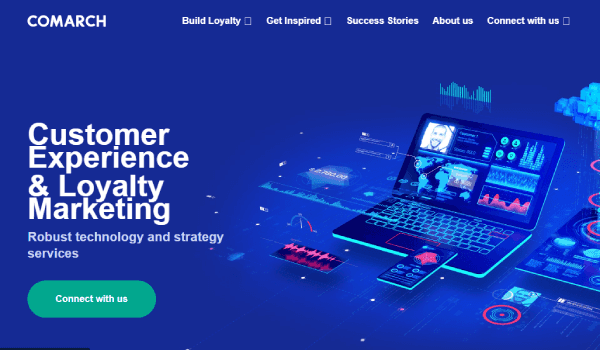
Comarch (Comarch Loyalty Management)
Comarch is a global software development company based in Poland. Comarch’s customer loyalty marketing platform offers a wide range of features, including customer segmentation, rewards management, and fraud prevention, with strong AI capabilities. Comarch have many clients across the world, tailored to enterprise clients, with the likes of BP, Costa Coffee, Heathrow Airport, and technicolor as some of their key clients.
Key features:
- Can build the front-end solution across website and app, meaning a single platform can deliver the entire front-end and backend omnichannel solution, complete with AI powered marketing and campaigns.
- Renowned for the size of their development team which numbers in the thousands.
Best for:
- Large enterprise and multinational clients
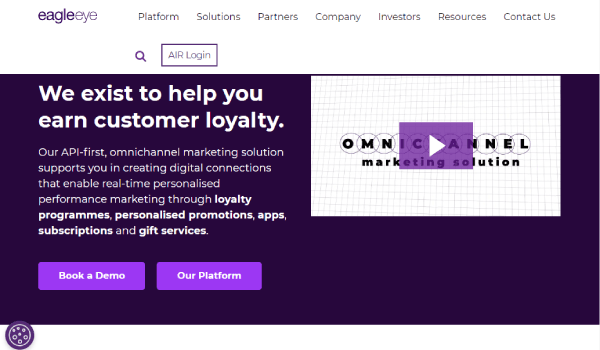
Eagle Eye (Eagle Eye AIR)
Eagle Eye offers Eagle Eye AIR, a robust API-first, omnichannel marketing loyalty and promotions platform based in the UK. Eagle Eye specialises in the hospitality and retail industries, with key clients including the JD, Loblaws, Pret and Woolworths Group.
Key features:
- Real-time, omnichannel POS connection & basket adjudication.
- Can deliver the full suite of customer engagement tactics: points, promotions, charity donations, coalitions, subscriptions, continuity schemes, gamification and more.
Best for:
- Large enterprise clients, primarily in the Retail and Hospitality industries.
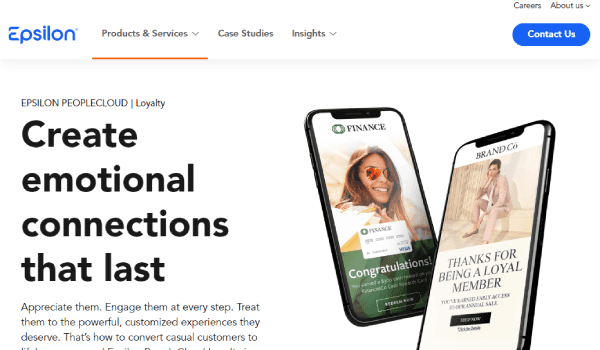
Epsilon (Epsilon PeopleCloud)
Epsilon PeopleCloud lead a robust data-driven platform and have become a loyalty platform leader in security of consumer information. Based in the US, Epsilon have clients in the retail, financial services, travel, and hospitality industries, with some of their prominent loyalty clients being Dunkin Donuts, Sally Beauty and Walgreens.
Key features:
- Flexibility, scalability, first-party data activation and strong performance for most brand’s needs, with pristine security features.
- Is a robust data-driven platform, with machine learning and predictive analytics used to glean real-time results so you can optimise your program on the fly.
Best for:
- Large enterprise clients.
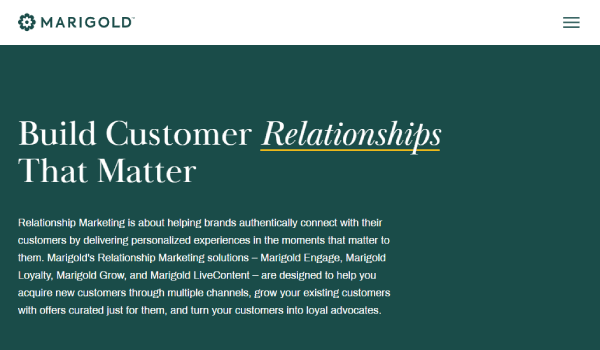
Marigold (Engage+ and Loyalty)
Formerly Cheetah Digital, the company is now known as Marigold. Its seven products – including Campaign Monitor, Cheetah Digital, Emma, Liveclicker, Sailthru, Selligent and Vuture – incorporate the new branding and offer a combined suite of products across martech, email and loyalty solutions – Marigold Grow, Marigold Engage and Marigold Loyalty. Loyalty clients include Donatos Pizza and Kauai.
Key features:
Best for:
- Medium-to enterprise-sized clients requiring all-in-one loyalty, marketing and CDP.
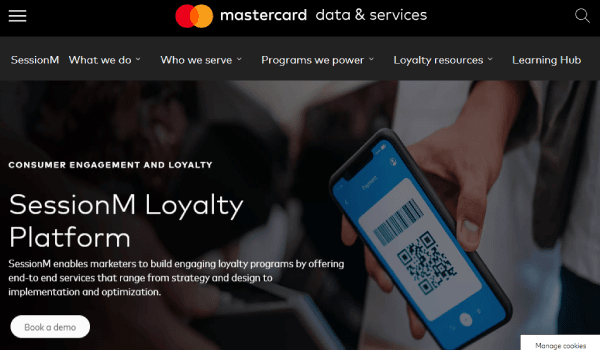
Mastercard (SessionM Loyalty Platform)
Acquired by Mastercard Data and Services, the Session M loyalty platform includes a loyalty rules engine, CDP, offer management and promo engine, and analytics. Session M is headquartered in the US, with their most prominent clients including the likes of large enterprises such as Chipotle, Coca-Cola, Central Group, Urban Outfitters.
Key features:
- Highly robust capabilities with ML and AI components. One stand-out feature is their machine-learning marketing module which supports the execution of targeted and personalised campaigns using automatically generated whitelists.
- Global scale and capabilities offer delivery and optimization services at a scale that few other platforms can provide.
Best for:
- Large enterprise and multinational clients.
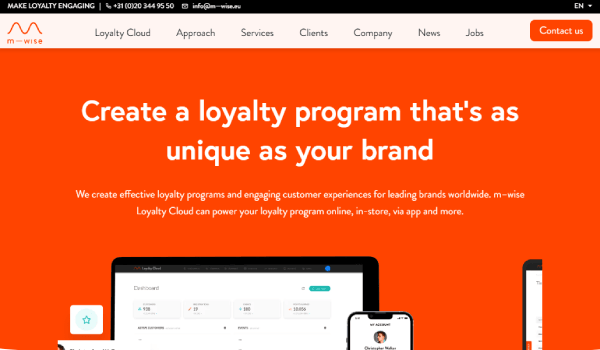
m-wise (m-wise Loyalty Cloud)
m-wise offers Loyalty Cloud, a loyalty management software that supports multiple program types, including vouchers, tiers, badges, gamification, partner offers, points and other benefits. Based in The Netherlands, capabilities include a 1-to-1 customer journey builder, back-end management and insights, a customisable white-label loyalty app and a segment builder. Clients include Cooler Master, Eneco, Game Mania.
Key features:
- Voucher creation tool with advanced customisation options, including support for multilingual needs.
- Drag-and-drop segment builder caters to marketing-friendly users who need to develop segments and deliver campaigns quickly, as well as supporting custom SQL queries.
Best for:
- Medium-to enterprise-sized clients.
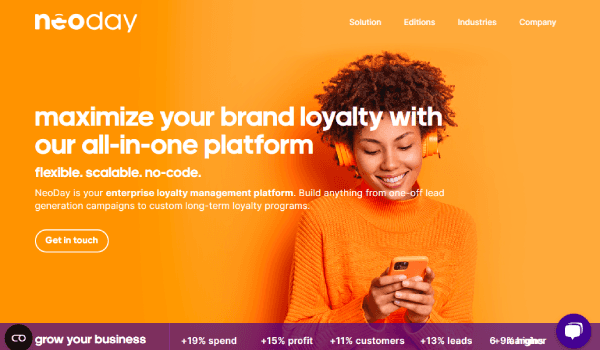
NeoDay
NeoDay is an all-in loyalty software solution developed by Magneds, a full-service loyalty management provider. Headquartered in The Netherlands, the loyalty provider offers a flexible end-to-end solution which can power most loyalty program frameworks with no-code required. NeoDay primarily operates in retail, FMCG, petrol and leisure, with clients such as FrieslandCampina Eurosparen, Heineken, Lidl and Pathé Cinemas.
Key features:
- Flexible solution which can support the front-end of customer interaction, as well as management of back-end capabilities and data, including a unique visual campaign builder with a built-in WYSIWYG editor.
- Offers three software editions with tier-based pricing to accommodate levels of business requirements, with the ability to provide a reward store and native app builds.
Best for:
- Medium-to enterprise-sized clients, particularly retail and FMCG.
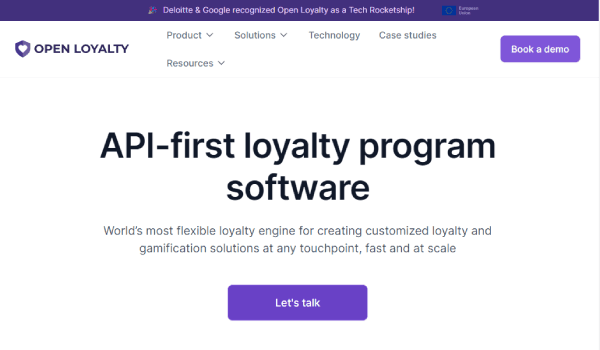
Open Loyalty
Open Loyalty was founded and is based in Poland and is an API-first loyalty program software platform with a headless approach, with an extremely flexible solution. Key clients include US Soccer and Equiva.
Key features:
- Extremely flexible loyalty engine for creating customised loyalty and gamification solutions at any touchpoint, using modular blocks.
- Contains a Campaign Simulator, which displays to the user what the effect of a proposed campaign will be and all other campaigns in market. This ensures that similar campaigns are not concurrently in market at the same time.
Best for:
- Medium-to enterprise-sized clients looking for a customisable and flexible solution.
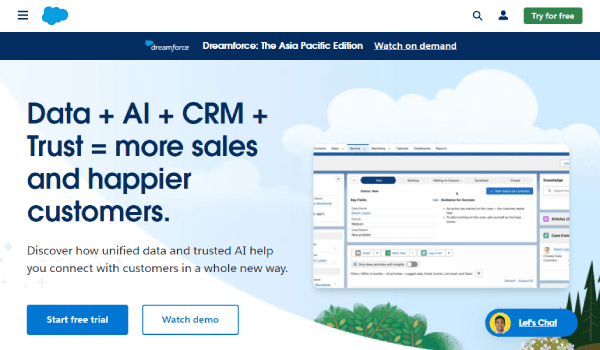
Salesforce (Salesforce Loyalty Management)
Based in the US, Salesforce’s loyalty management solution is unified, cross-industry solution that offers a host of features that enable brands to plan and design loyalty programs. Salesforce have heavily invested in evolving their loyalty product in recent years to be able to contend with other long-standing loyalty platforms. Their prominent loyalty clients include ITA Airways, MECCA and Shoe Carnival.
Key features:
- Strong support for A/B Testing, with ability to test different variants of promotions and offers to different audiences, with comparative performance reporting.
- Natively connects with the rest of the Salesforce product suite, including CRM and Salesforce Marketing Cloud for a single management view of customer relationships.
Best for:
- Enterprise clients, particularly those using Salesforce for Marketing and CRM.
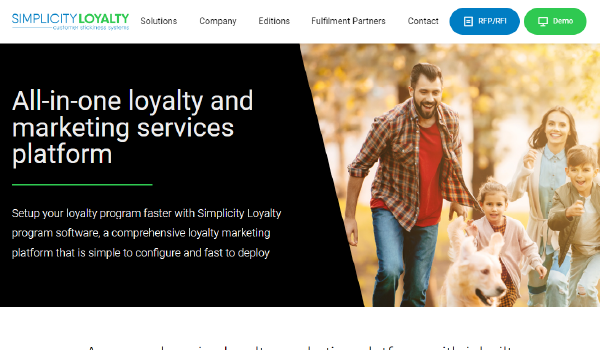
Simplicity Loyalty
Simplicity Loyalty is a NZ based rapid deployment loyalty program application and marketing platform that powers loyalty programs for quick service restaurants, franchises, and numerous other multi-store retailers. Clients of Simplicity Loyalty include Clipsal by Schneider Electric, getplus and Subway.
Key features:
- Flexible rules engine which can support any promotion such as bonus points, cash back, buy X get one free, time-bound offers – all configured centrally and available in real-time.
- Fully featured inbuilt loyalty campaign management studio to setup, test and execute loyalty marketing campaigns (and ad hoc general campaigns) across multiple channel.
Best for:
- Medium-to enterprise-sized clients, particularly in retail and fashion.
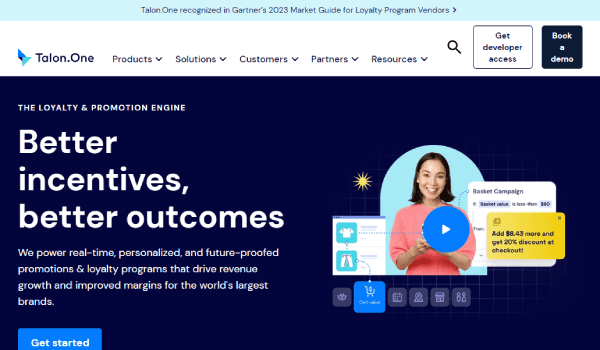
Talon.One
Based out of Germany, Talon.One provide a powerful engine for all types of promotion with an API first lens and strong integrations. Their platform can support all loyalty program types, multi-brand loyalty and seamlessly integrates with POS, online, in-app and other servicing tools. The platform also extends as a promotion engine, with a highly intuitive user interface for back-end management. Loyalty clients include Adidas, boohoo, H&M and Reebok.
Key features:
- Outstanding and flexible offers and promotions engine with strong integration capabilities.
- Extremely user-friendly administrative portal for program management.
Best for:
- Medium-to enterprise-sized clients, particularly in retail & ecommerce and travel & mobility.
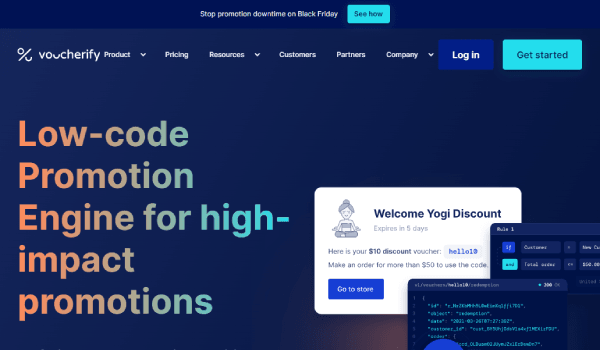
Voucherify
Voucherify is originally based out of Poland, offering a loyalty and promotions engine that helps businesses run personalised coupons, gift cards, auto-applied promotions, loyalty programs and referral campaigns. The platform is targeted at offering an affordable, API-first promotion software. Loyalty clients include Philips, Vodafone and Timezone.
Key features:
- Flexible pricing model offers a good choice for scalability and businesses of all sizes.
- Sophisticated rules engine allow users to create highly targeted promotions tailored to business goals.
Best for:
- Small, Medium and enterprise-sized clients, particularly in food & beverages, finance & insurance and fitness & health.
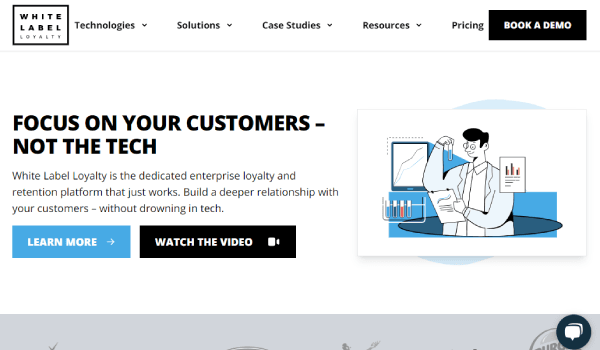
White Label Loyalty
Based in the UK, White Label Loyalty provides a loyalty solutions platform based on a flexible API. The platform has a powerful back-end system with the option to add additional modules on top of the core. Clients include PepsiCo, Burger King EMEA, and Wesleyan.
Key features:
- Platform allows data capture from a wide variety of sources, including card linking, receipt scanning and other existing integrations.
- Off-the-shelf mobile loyalty card app, microsite and loyalty app software development kit (SDK) offers a simple, customisable solution for businesses with relevant requirements.
Best for:
- Small, Medium and enterprise-sized clients.
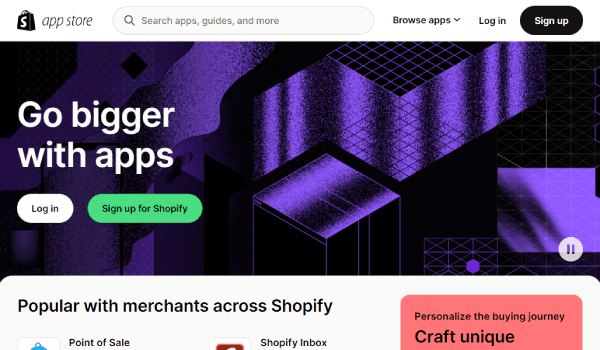
Plus: eCommerce and Shopify loyalty apps (e.g., Flaunt Loyalty, Smile, LoyaltyLion, Yotpo)
There are various loyalty platforms and loyalty apps that cater to eCommerce businesses and Shopify businesses. These platforms include Flaunt Loyalty, LoyaltyLion, Smile and Yotpo, and typically provide loyalty solutions and capabilities that are are ideal for eCommerce businesses and/or running on Shopify’s platform.
Key features:
- Integrates with the Shopify platform, and designed specifically for Shopify merchants, as well as small business loyalty programs.
- Pricing is typically lower and more aligned to eCommerce and Shopify businesses, in comparison to larger loyalty platforms (which is often reflected in the capabilities).
- Key capabilities and loyalty program features are primarily focused on eCommerce customer behaviour (notably, some platforms such as Flaunt Loyalty do include unique elements such as Roblox integration).
Best for:
- eCommerce and Shopify businesses across all business sizes (note: large, enterprise-sized clients typically require greater customisation and therefore another platfrom from the list).
Tip: Loyalty platform vendors are headquartered around the world, but most of them have local teams (some with extensive local region teams) all across the world such as in the US, the UK, Europe, and APAC (including Australia). Vendors without local teams can still implement and operate your program, but it is your decision if you require a local team. Consider this in the research step.
Choosing the right loyalty platform for your business and program design
Choosing the right loyalty platform for your business is an essential decision that can have a major impact on the success of your loyalty program. By following the steps outlined, and considering the key features listed above, you can select the platform that best meets your needs and helps you achieve your loyalty program and business goals.
For the most successful loyalty program launch, consider engaging a loyalty expert like Loyalty & Reward Co. This can be a wise investment, as they can help you run the process more efficiently and effectively. True loyalty management services will not prioritise their own products or partnerships, but your objectives and success.
Seeking loyalty technology advice on selecting a platform solution?
At Loyalty & Reward Co, we pride ourselves on our deep expertise in loyalty technology, coupled with our unwavering commitment to providing agnostic, independent guidance that prioritises the most suitable technology solution based on business needs and goals, and carefully evaluating your objectives and loyalty program design.
Contact us now to schedule a 30-minute consultation and discover how our independent technology expertise can help your loyalty program goals.

